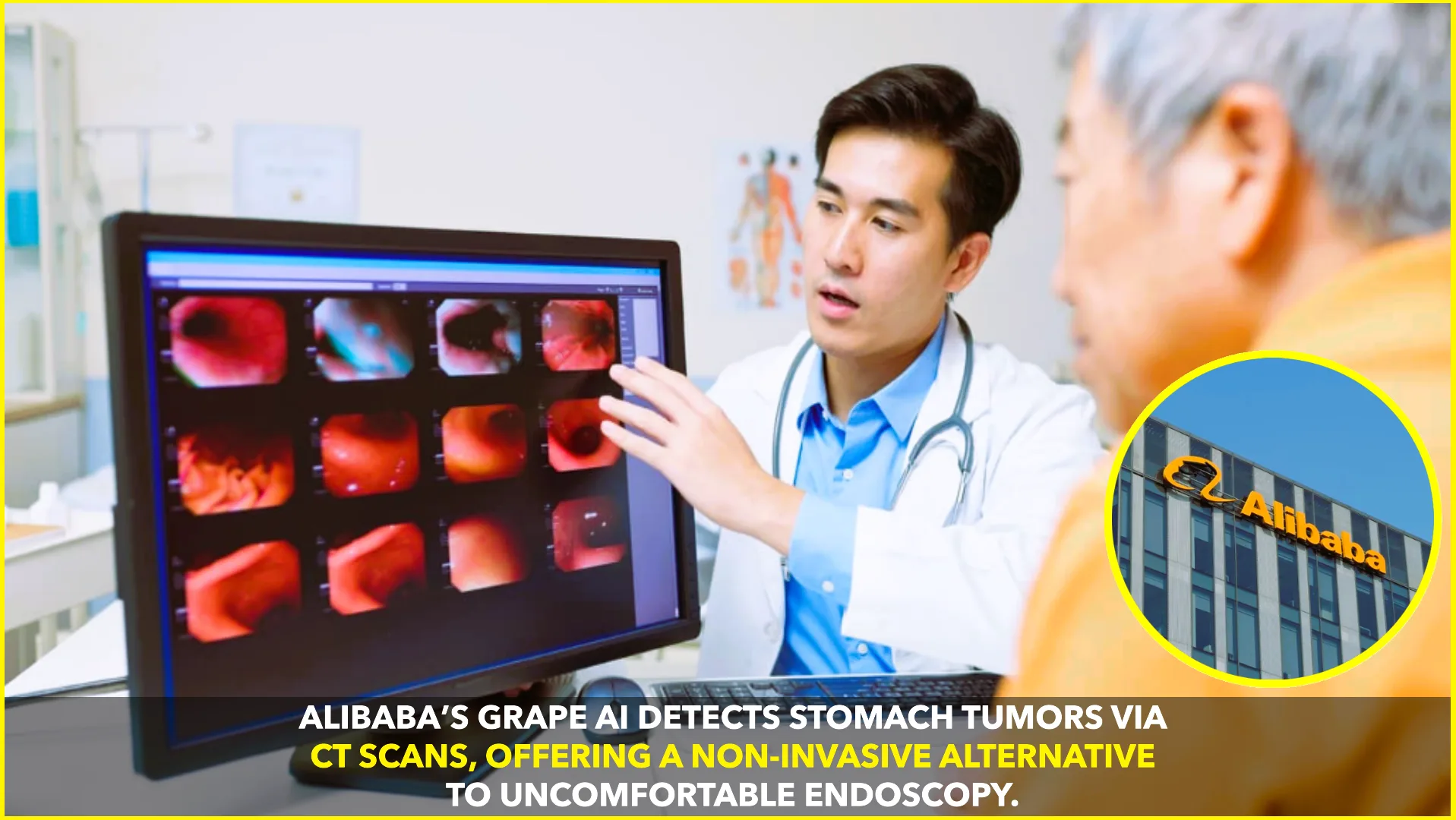Alibaba Group’s research arm, Damo Academy, in collaboration with Zhejiang Cancer Hospital, has unveiled an artificial intelligence system named Grape (Gastric Cancer Risk Assessment Procedure), the world’s first AI model capable of detecting stomach cancer non-invasively through standard CT scans facebook.com+14interestingengineering.com+14rudebaguette.com+14techinasia.comfacebook.com. Traditionally, diagnosing gastric cancer has required endoscopy—a procedure involving a camera probe inserted through the throat that many patients find uncomfortable, leading to low compliance rates under 30% in China scmp.com+1interestingengineering.com+1.
How Grape Works
Built with deep-learning technology, Grape tackles CT-frequency weaknesses in gastric imaging—such as variable anatomy, stomach filling, and early-stage lesion subtlety—by training on the world’s largest multi-center dataset of non-contrast CT images for gastric cancer english.news.cn+2english.news.cn+2perplexity.ai+2. It employs a two-stage approach: first segmenting the stomach region in the 3D scan, then cropping this area and running a combined segmentation/classification neural network to flag cancer presence english.news.cn+9nature.com+9medicalxpress.com+9.
Extensive validation—including internal and external cohorts—revealed stellar performance: 85.1% sensitivity and 96.8% specificity, outperforming radiologists by 21.8% and 14%, respectively cybernews.com+11interestingengineering.com+11perplexity.ai+11. In real-world trials capturing over 78,000 routine non-contrast CT scans from hospitals between 2018–2024, the AI flagged 17.7%–24.5% of high-risk cases in some hospitals, even among asymptomatic patients english.news.cn+5english.news.cn+5medicalxpress.com+5.
Real‑World Impact
A particularly compelling story involves a patient whose CT scan—taken six months before clinical diagnosis—was retrospectively analyzed by Grape, which identified a tumor markers that radiologists had overlooked, enabling earlier intervention facebook.com+15english.news.cn+15rudebaguette.com+15. These results underscore Grape’s potential to shift the cancer detection paradigm by enabling earlier treatment, improved outcomes, and minimized patient discomfort.
Compared to traditional diagnostics—endoscopy and serological tests, which often detect fewer than 1.5% of early-stage cases—Grape offers a compelling alternative. Non-contrast CT is already prevalent and inexpensive in routine medical exams, making this AI tool both accessible and scalable, particularly in low-resource regions cybernews.com+3rudebaguette.com+3perplexity.ai+3cybernews.com+1perplexity.ai+1.
A Complement, Not Replacement
While Grape shows great promise, researchers note that it is not designed to replace endoscopy. Instead, it’s poised to complement existing screening programs by serving as an initial triage filter—flagging high-risk patients who would then receive targeted endoscopy. This two-step strategy could dramatically increase early detection rates, saving lives and reducing costs nature.com.
Looking Ahead
With the study already published in Nature Medicine, deployment of Grape is underway across high-risk regions of China like Zhejiang and Anhui medicalxpress.com+9interestingengineering.com+9rudebaguette.com+9. Additionally, it builds upon the success of Alibaba’s earlier AI tool, Damo Panda, which detects pancreatic cancer and earned FDA “breakthrough device” status in 2023. Alibaba, in partnership with the WHO, plans to deploy these tools globally, particularly in underserved areas, to reduce cancer-care disparities rudebaguette.com.
Future research—including prospective nationwide screening trials—is on the horizon, aiming to further refine Grape’s early-stage sensitivity, expand datasets, and potentially apply stomach-distension protocols to improve tumor visibility during imaging english.news.cn+7nature.com+7medicalxpress.com+7.
Conclusion
Alibaba’s Grape AI model marks a transformative advance in non-invasive cancer diagnostics. By leveraging routine CT scans, it not only bypasses the discomfort of endoscopy but also delivers high accuracy, early detection, and scalability. As it rolls out across China and beyond, Grape paves the way for a future where catching a silent killer like gastric cancer can be as simple and painless as a routine CT scan.










